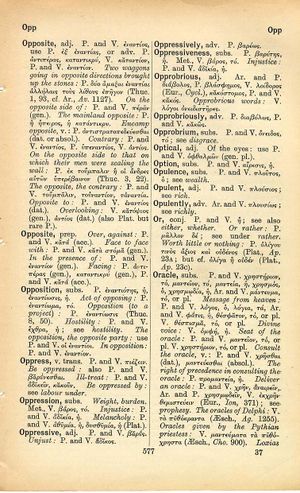opposite: Difference between revisions
νὺξ μὲν ἐμὸν κατέχει ζωῆς φάος ὑπνοδοτείρη → sleep-giving night hath quenched my light of life | sleep-giving night covers my light of life | night, the giver of sleep, holds the light of my life
(Woodhouse 4) |
(CSV4) |
||
| Line 1: | Line 1: | ||
{{ | {{Woodhouse1 | ||
| | |Text=[[File:woodhouse_577.jpg|thumb|link={{filepath:woodhouse_577.jpg}}]]'''adj.''' | ||
P. and V. [[ἐναντίος]], use P. ἐξ ἐναντίας, or adv. P. [[ἀντιπέρας]], [[καταντικρύ]], V. [[καταντίον]], P. and V. [[ἐναντίον]]. | |||
<b class="b2">Two waggons going in opposite directions brought up the stones</b>: P. δύο ἅμαξαι ἐναντίαι ἀλλήλαις τοὺς λίθους ἐπῆγον (Thuc. 1, 93, cf. Ar., <b class="b2">Av.</b> 1127). | |||
<b class="b2">On the opposite side of</b>: P. and V. [[πέραν]] (gen.). | |||
<b class="b2">The mainland opposite: P</b>, ἡ [[ἤπειρος]], ἡ κατάντικρυ. | |||
<b class="b2">Encamp opposite</b>, v.:P. ἀντιστρατοπεδεύεσθαι (dat. or absol.). | |||
<b class="b2">Contrary</b>: P. and V. [[ἐναντίος]], P. [[ὑπεναντίος]], V. [[ἀντίος]]. | |||
<b class="b2">On the opposite side to that on which their men were scaling the wall</b>: P. ἐκ τοὔμπαλιν ἢ οἱ ἄνδρες αὐτῶν ὑπερέβαινον (Thuc. 3, 22). | |||
<b class="b2">The opposite, the contrary</b>: P. and V. τοὔμπαλιν, τοὐναντίον, τἀναντία. | |||
<b class="b2">Opposite to</b>: P. and V. [[ἐναντίος]] (dat.). | |||
<b class="b2">Overlooking</b>: V. [[κατόψιος]] (gen.), [[ἀντίος]] (dat.) (also Plat. but rare P.). | |||
'''prep.''' | |||
<b class="b2">Over, against</b>: P. and V. [[κατά]] (acc.). | |||
<b class="b2">Face to face with</b>: P. and V. κατὰ [[στόμα]] (gen.). | |||
<b class="b2">In the presence of</b>: P. and V. [[ἐναντίον]] (gen.). | |||
<b class="b2">Facing</b>: P. [[ἀντιπέρας]] (gen.), [[καταντικρύ]] (gen.), P. and V. [[κατά]] (acc.). | |||
}} | }} | ||
Revision as of 09:47, 21 July 2017
English > Greek (Woodhouse)
adj.
P. and V. ἐναντίος, use P. ἐξ ἐναντίας, or adv. P. ἀντιπέρας, καταντικρύ, V. καταντίον, P. and V. ἐναντίον. Two waggons going in opposite directions brought up the stones: P. δύο ἅμαξαι ἐναντίαι ἀλλήλαις τοὺς λίθους ἐπῆγον (Thuc. 1, 93, cf. Ar., Av. 1127). On the opposite side of: P. and V. πέραν (gen.). The mainland opposite: P, ἡ ἤπειρος, ἡ κατάντικρυ. Encamp opposite, v.:P. ἀντιστρατοπεδεύεσθαι (dat. or absol.). Contrary: P. and V. ἐναντίος, P. ὑπεναντίος, V. ἀντίος. On the opposite side to that on which their men were scaling the wall: P. ἐκ τοὔμπαλιν ἢ οἱ ἄνδρες αὐτῶν ὑπερέβαινον (Thuc. 3, 22). The opposite, the contrary: P. and V. τοὔμπαλιν, τοὐναντίον, τἀναντία. Opposite to: P. and V. ἐναντίος (dat.). Overlooking: V. κατόψιος (gen.), ἀντίος (dat.) (also Plat. but rare P.). prep. Over, against: P. and V. κατά (acc.). Face to face with: P. and V. κατὰ στόμα (gen.). In the presence of: P. and V. ἐναντίον (gen.). Facing: P. ἀντιπέρας (gen.), καταντικρύ (gen.), P. and V. κατά (acc.).

